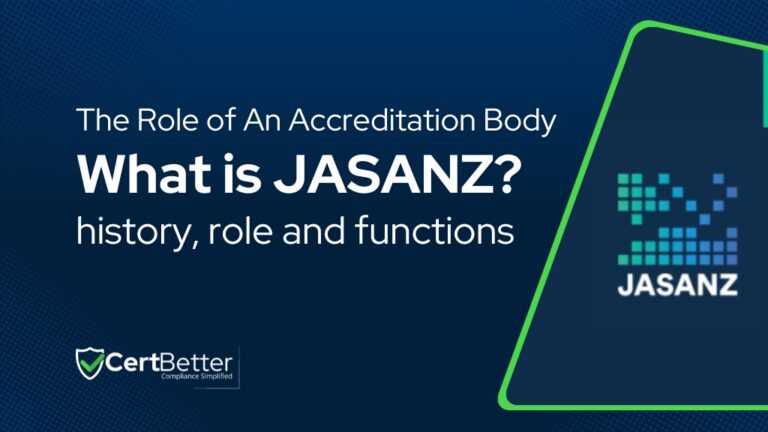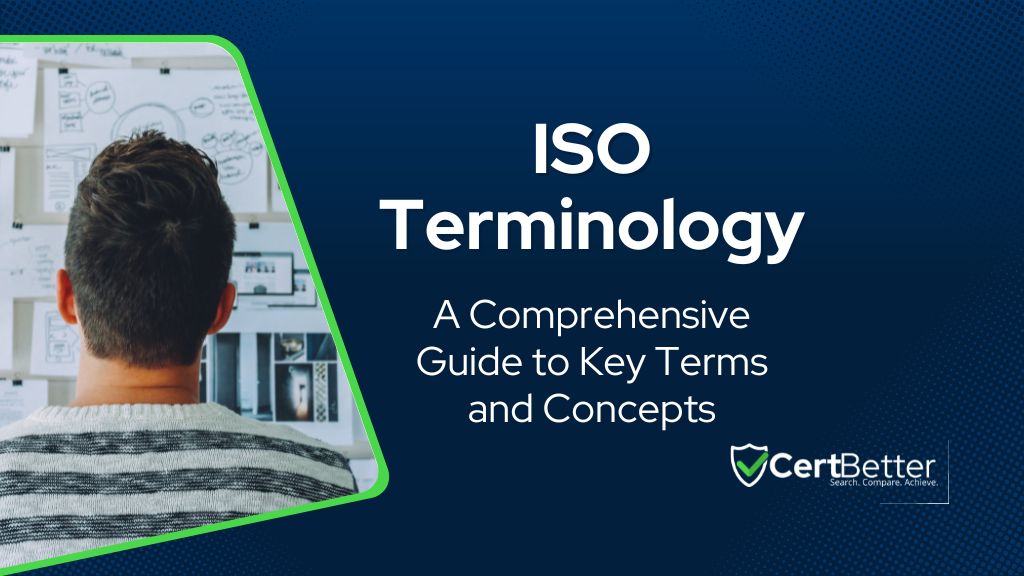What is JASANZ? The Role of An Accreditation Body

If you’re navigating the world of standards, certifications and compliance, you’ve likely encountered various organisations. A master player in the compliance field in Australia and New Zealand is JASANZ (previously JAS-ANZ).
This article aims to explore everything around the accreditation body JASANZ: its history, role and functions, and most importantly, its impact on industries and consumers.
1: Background of JASANZ
The Joint Accreditation System of Australia and New Zealand (JASANZ) is an accreditation body established in 1991 that oversees the accreditation of conformity assessment bodies (generally known as Certification Bodies) in the Australia-New Zealand region and overseas for the following compliance schemes:
- Environment and Sustainability
- Health and Human Services
- Business and Innovation
- Food and Biological Systems
- Product Certification
Accreditation, in simple terms, is a formal recognition that an organization demonstrates the competency to perform conformity assessments. In this case, JASANZ accredits the independent certification or inspection bodies that might be offering you certification services.
2: How does JASANZ work?
The Governing Board — JASANZ operates under the guidance of a 10-member Governing Board, in line with the provisions of the Treaty between Australia and New Zealand.

This Board exclusively holds authority over JAS-ANZ’s rights and responsibilities. It is responsible for appointing the members of both the Technical Advisory Council and the Accreditation Review Board.
The composition of the board is as follows:
- The Australian Minister appoints six members.
- The Minister in New Zealand appoints three members.
- The Chief Executive of JAS-ANZ serves as the tenth board member.
- Additionally, the board includes one government official from each country.
Technical Advisory Council — representing JASANZ stakeholders (like ISO and technical experts) responsible for overseeing the accreditation activities is transparent and impartial. This Council also oversees working groups and technical committees.
Accreditation Review Board — responsible for making decisions on granting, maintaining, extending, reducing, suspending and withdrawing accreditation.
Secretariat — responsible for administration activities.
3: Role of JASANZ
While businesses may wonder why there’s a need for such a body, the essence lies in ensuring trust.
JASANZ uses a strict process with standards and technical experts to check and officially recognise the skills and dependability of inspection and certification bodies like SGS or Intertek.
This ensures that these conformity assessment bodies (or certification bodies) can effectively evaluate and certify other organizations, maintaining a high standard of quality and trust within the industry.
With JASANZ, organisations can be confident that the certifications they obtain and the bodies they engage with meet stringent quality standards. This fosters trust among consumers, stakeholders, and regulators.
4: JASANZ under the IAF Canopy
The International Accreditation Forum (IAF) is the global association for accreditation bodies.
Being a member of the IAF ensures that the certifications provided by JAS-ANZ are recognized worldwide. This is crucial for businesses seeking international market access or global partnerships.
Being under the IAF umbrella, JAS-ANZ is bound to:
- Harmonise its accreditation practices with IAF guidelines.
- Undergo peer evaluations to ensure its practices are up to global standards.
- Participate in mutual multi-national recognition arrangements.
JASANZ is also a member of other international forums and national bodies such as Ministry of Industries in New Zealand.
5: Benefits of JASANZ Accreditation
Global Recognition — With JAS-ANZ’s mutual recognition arrangements, the accreditations are recognized internationally, expanding the reach of businesses.
Quality Assurance — Accreditation ensures a consistent level of service, which in turn boosts the reputation and credibility of businesses.
Reduced Risk — A JAS-ANZ’s accredited body’s certification implies reduced risks associated with product failures, recalibrations, or retractions.
6: Do You Need Accreditation or Certification?
Just to clarify the basic concepts here, we’ll add more information on this confusing topic ever! While these terms are often used interchangeably, they are inherently different:
Accreditation — pertains to the formal recognition of competence. When JASANZ accredits a certification body, it’s a nod to their ability to consistently deliver valid results in their scope of activity (which in this case is to grant certification to companies).
Certification — is a procedure by which a certification body grants a written statement that a product, service or system in question meets specific requirements or standards.
To simplify, think of accreditation as a qualification for the certification bodies, while certification is the stamp of approval they give to businesses.
7: Challenges faced by JASANZ
While JASANZ plays a pivotal role in maintaining standards, it’s not without challenges:
Keeping Up with Evolving Standards — As industries evolve, standards need to be updated, which requires JAS-ANZ to be agile and proactive.
Balancing Local and Global Needs — JAS-ANZ must ensure that local businesses meet global standards without hampering regional growth.
8: For Businesses: Should You Care?
Boosted Credibility — Engaging with JAS-ANZ accredited bodies guarantees the highest standards, instilling confidence among stakeholders and consumers.
Easier Market Access — JAS-ANZ’s association with IAF facilitates easier entry into international markets for better growth.
Continuous Improvement — Certification with accredited (certification) bodies audited by JAS-ANZ ensures regular updates in line with the IAF framework, helping businesses to continually improve.
Conclusion
Navigating the world of standards and certifications might seem daunting. However, with bodies like JASANZ at the helm, businesses in Australia and New Zealand can be assured of impeccable standards and international recognition of your business practice, products or services.
For companies in Australia and New Zealand and even those outside these regions looking for a recognised certification, understanding JAS-ANZ and its significance is a step in the right direction.
- Last updated: May 22, 2024
- CertBetter
Our community of compliance professionals and ISO experts is ready to provide you with insightful answers and practical solutions. Join the discussion now!
- Recommended Reads
- 33 reads
-
Frequently Asked Questions
Understanding ISO Terminology: Guide to Important Terms and Concepts
No posts found
ResetConnect with ISO Certification Consultants
CertBetter makes it easy to find ISO certification consultants and compliance professionals from around the globe.

